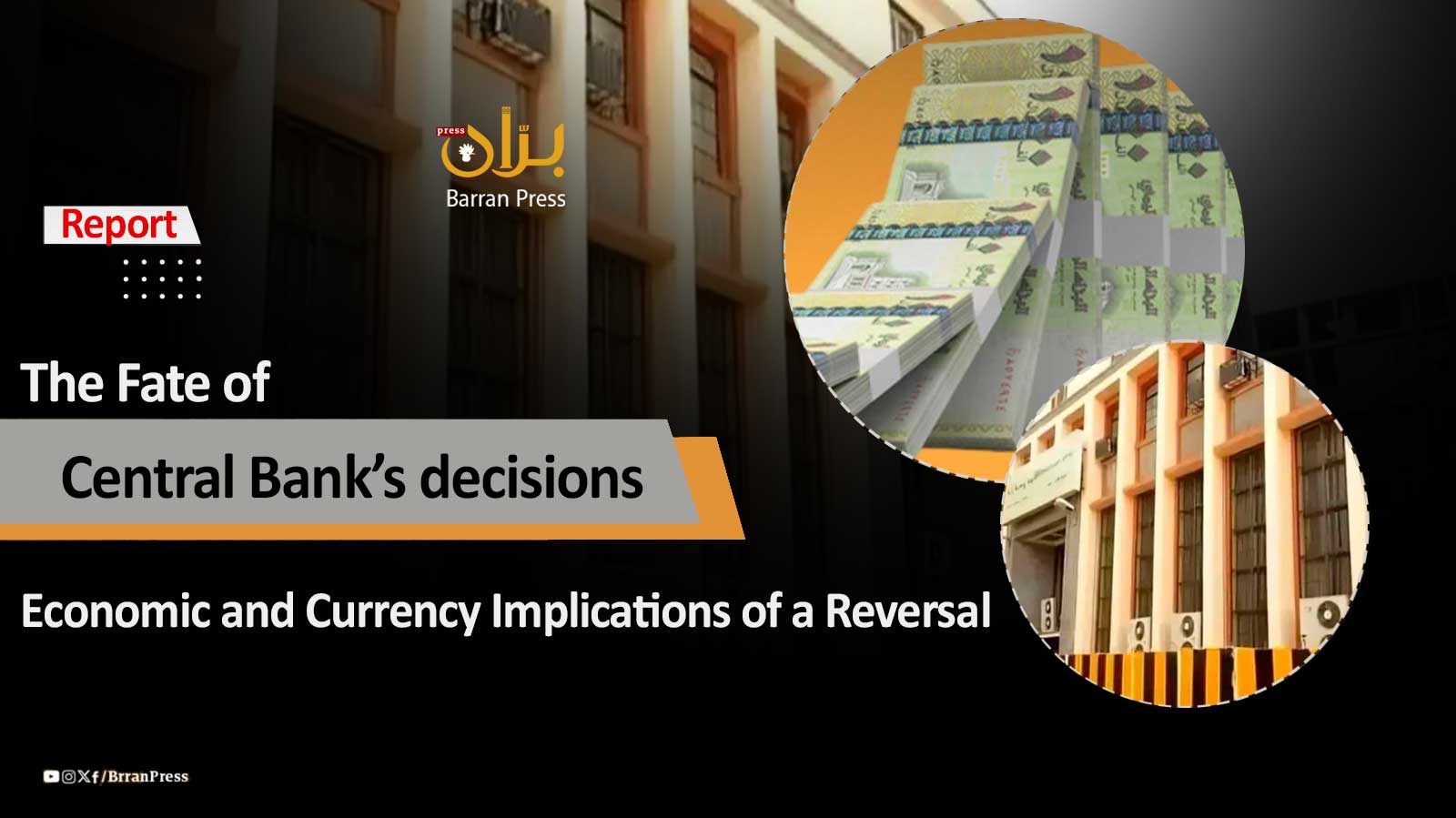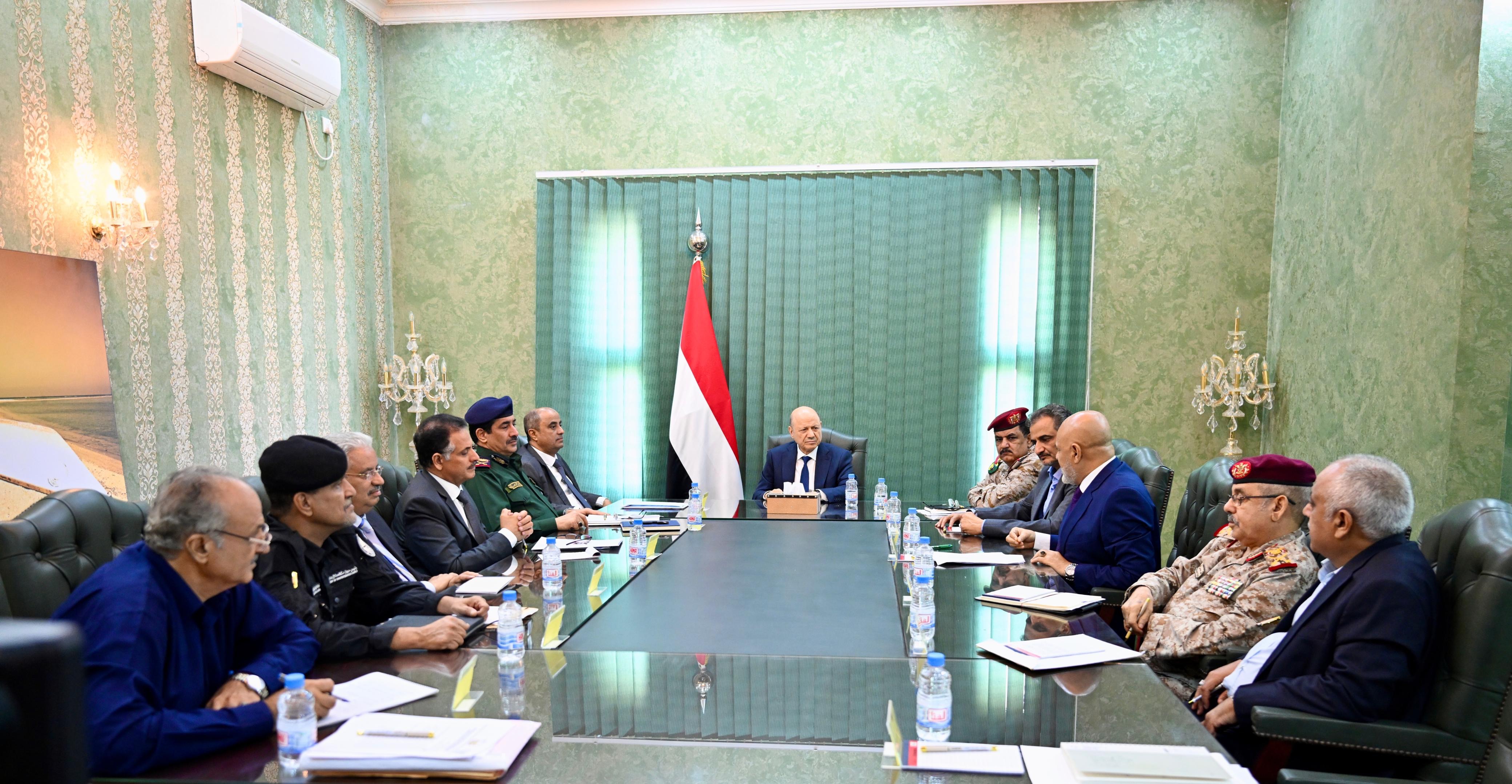
Barran Press
The recent decisions made by the Central Bank of Yemen, headquartered in the temporary capital of Aden, continue to be a focal point of debate among Yemenis, both in public spaces and on social media platforms.
These discussions have intensified as international and UN actors push for the internationally recognized Yemeni government to reverse these decisions, citing their potential negative impact on the Yemeni economy and the escalating humanitarian crisis.
Last week, protests erupted in the governorates of Marib, Taiz, and Hodeidah in support of the Central Bank's decisions, which are seen as a "decisive" step towards establishing the bank's legal authority, controlling the banking sector, and fulfilling its mandate in overseeing banks, combating money laundering, and countering terrorism financing.
Earlier, Yemeni political parties and forces issued a statement urging the Presidential Leadership Council to resist international pressure and not back down from the Central Bank's decisions, warning of catastrophic consequences that could push the country and its people into an uncertain future.
To understand the potential scenarios arising from this pressure on the internationally recognized Yemeni government and the potential repercussions for the national economy if the bank were to reverse its decisions, "Barran Press" reached out to several experts and researchers.
Grave Consequences
Economic expert and analyst, "Fars al-Najjar," expressed surprise at the UN envoy's statement in his letter to the head of the Presidential Leadership Council, questioning the envoy's silence when the Houthis targeted ports and deprived the state budget of 70% of its resources, resulting in an annual loss of $1.5 billion.
"Where was the UN envoy in the face of systematic terrorist actions against businessmen, preventing them from importing goods from legitimate ports, and pressuring them to import from Hodeidah port?" al-Najjar asked in his interview with "Barran Press," adding that the Houthis also imposed "strict measures on goods coming from legitimate ports, preventing trucks from entering, and imposing 100% customs duties and taxes on any goods coming from areas under the control of the legitimate government."
He added that "these measures led to a 20% decline in customs and tax revenues from January to May 2024 compared to the same period in 2023, leading to a 5% monthly depreciation of the currency during the first half of 2024, with the exchange rate reaching approximately 1900 riyals per dollar, a decline of 20%."
Regarding the potential scenarios following the UN envoy's letter, al-Najjar said that "the Presidential Leadership Council has been clear on this matter, emphasizing that any dialogue must be conducted according to a specific agenda, with priorities including the resumption of oil exports, the cessation of unilateral arbitrary actions against the banking sector and the business sector, and addressing the issue of currency division and its documentation."
He believes that "the UN envoy wants to give an opportunity to close the file related to the Red Sea, as American actions are based on what is happening in the Red Sea, not the interests of Yemenis," adding that "pressure will likely be exerted to resolve these issues and the priorities set."
Al-Najjar stressed the need for the UN envoy to be aware of Article 9, Paragraph 55 of the UN Charter, which he said explicitly states that the UN must work to improve the economic conditions of individuals and groups.
Al-Najjar expressed surprise at the UN's interventions and "its repeated attempts to rescue the Houthi group." In his opinion, "what is happening today is similar to what happened yesterday, especially regarding the Stockholm Agreement, when government forces were on the verge of liberating Hodeidah."
Regarding the position of the Presidential Leadership Council, he said that the council "has repeatedly affirmed its openness to all proposals, and there is flexibility regarding these decisions and their discussion in a way that serves the public interest and ultimately protects the banking sector."
What is needed today, according to al-Najjar, is "more decisions, measures, and policies that ensure the success of these decisions, and the implementation of measures that guarantee their success."
Regarding the possibility of maneuvering in the bank's decisions, al-Najjar said that "there is room in some decisions to take into account what serves the public interest, but not a complete reversal of decisions that represent the independence of the Central Bank." He added that "a complete reversal of these decisions would have serious consequences in terms of political reality, political momentum, and the political strength possessed by the Presidential Leadership Council, the Central Bank, and the government."
Concerns About State Structure
Marzouq Al-Gharbani, head of the Tahamah Center for Studies and Development, expressed concerns to "Barran Press" about the implications of these decisions for the state's structure and the political will to manage the country and the conflict. He highlighted the risks of:
- Equating the conflict: Al-Gharbani fears that the decisions could blur the lines between the state and the Houthi militias, creating an impression of equal footing in the conflict.
- Diminishing legitimacy: The decisions could undermine the legitimacy of the internationally recognized government institutions, reducing them to mere participants in economic negotiations.
- Fracturing national unity: The decisions could further exacerbate divisions within the national front, as evidenced by the silence of various political forces in strengthening the Presidential Leadership Council.
Al-Gharbani emphasizes that the government today is not the same as it was before, possessing the resources and means to counter international interference in the Yemeni file, especially considering that most of the hard currency in Sana'a banks belongs to international organizations and the UN.
He believes that halting bank operations would force the Houthis to relocate to Aden and open offices in the temporary capital.
Potential Scenarios Following UN Envoy's Message
Regarding the potential scenarios following the UN envoy's message, Al-Gharbani suggests two possibilities:
- Enhanced dialogue: The government could leverage the situation to raise the bar for dialogue and secure guarantees for economic gains. This hinges on the understanding that the Houthis are now limited to threats and superficial strikes, unable to overturn the military situation on the ground, and the international community's focus on more pressing issues, creating an opportunity to pressure the Houthis for a settlement that ensures relative stability and opens the door to more complex issues.
- Escalation of violence: A new round of military operations could erupt, potentially more bloody than before, with the coastal front becoming the main battleground. The Houthis, recognizing their failure to capture Marib, might see the coastal front as an opportunity to advance under the guise of the "resistance axis" and Gaza, promoting the narrative of controlling the coast to gain dominance over the Red Sea.
Al-Gharbani believes that the government has no choice but to enforce the bank's decisions, especially considering the potential for the latter scenario. He considers the current situation in the Red Sea a staged event that will ultimately lead to the implementation of the Central Bank's decisions, with the UN envoy's warning of a humanitarian crisis being a calculated move to control the situation.
Economic and Currency Implications
Regarding the potential impact of reversing or delaying the decisions on the economy and local currency, Al-Gharbani believes that the government will not back down from the Central Bank's decisions due to their catastrophic consequences for the economy and currency, effectively handing over control to the Houthis. He dismisses the possibility of cancellation.
He acknowledges that international diplomatic norms and channels might necessitate a delay under specific conditions, but even a delay would have detrimental effects on the cost of living and the local currency, burdening the citizens.
Political Analyst's Perspective
Political analyst Faris Al-Bil talked to "Barran Press", echoing similar concerns, and highlights the risks associated with reversing the bank's decisions
He said,
"There are economic risks, including a weakening of investor confidence in the government's economic system and a continued decline in the currency," Al-Bil explained. He emphasized that the necessary economic remedies have not been implemented, leading to a worsening economic situation and increased financial strain on the government, which is already struggling with a shortage of resources. Reversing the decisions, Al-Bil added, would also deprive the government of crucial avenues for replenishing its treasury.
The analyst also expressed concern about the political implications of reversing the decisions. He argued that such a move would weaken the government's position and undermine its legitimacy, potentially leading to a fragmentation of support for the government. This, he said, could erode public trust in the government's capabilities, fuel political dissent, and reduce the government's ability to mobilize support against the Houthis.
Background of the Central Bank's Decisions
On May 30th, the Central Bank of Yemen in Aden issued a decision to halt transactions with six Yemeni banks and financial institutions after they failed to relocate their headquarters to Aden within the 60-day deadline set by the bank.
Simultaneously, the bank issued another decision urging individuals, businesses, and financial institutions to deposit old banknotes issued before 2016 within 60 days.
These measures were part of the Central Bank's ongoing efforts to counter the economic actions taken by the Houthis, designated as a terrorist organization by the international community, against the banking sector, which has negatively impacted the economy and led to the depreciation of the Yemeni rial in government-controlled areas.
In recent weeks, the Central Bank, under Governor Ahmed Al-Maabqi, revoked the licenses of 26 exchange companies, ordered the closure of their branches indefinitely for violating bank regulations, and implemented a unified network for domestic transfers, banning transactions with 12 unauthorized electronic payment entities and discontinuing the use of local money transfer networks owned by banks, financial institutions, and exchange companies operating in Yemen.
These decisions underscore the complex and multifaceted nature of the ongoing conflict in Yemen, with economic and financial measures playing a crucial role in the power dynamics between the government and the Houthis. The potential consequences of reversing or delaying these decisions highlight the delicate balance between political, economic, and humanitarian considerations in the search for a lasting solution to the conflict.





